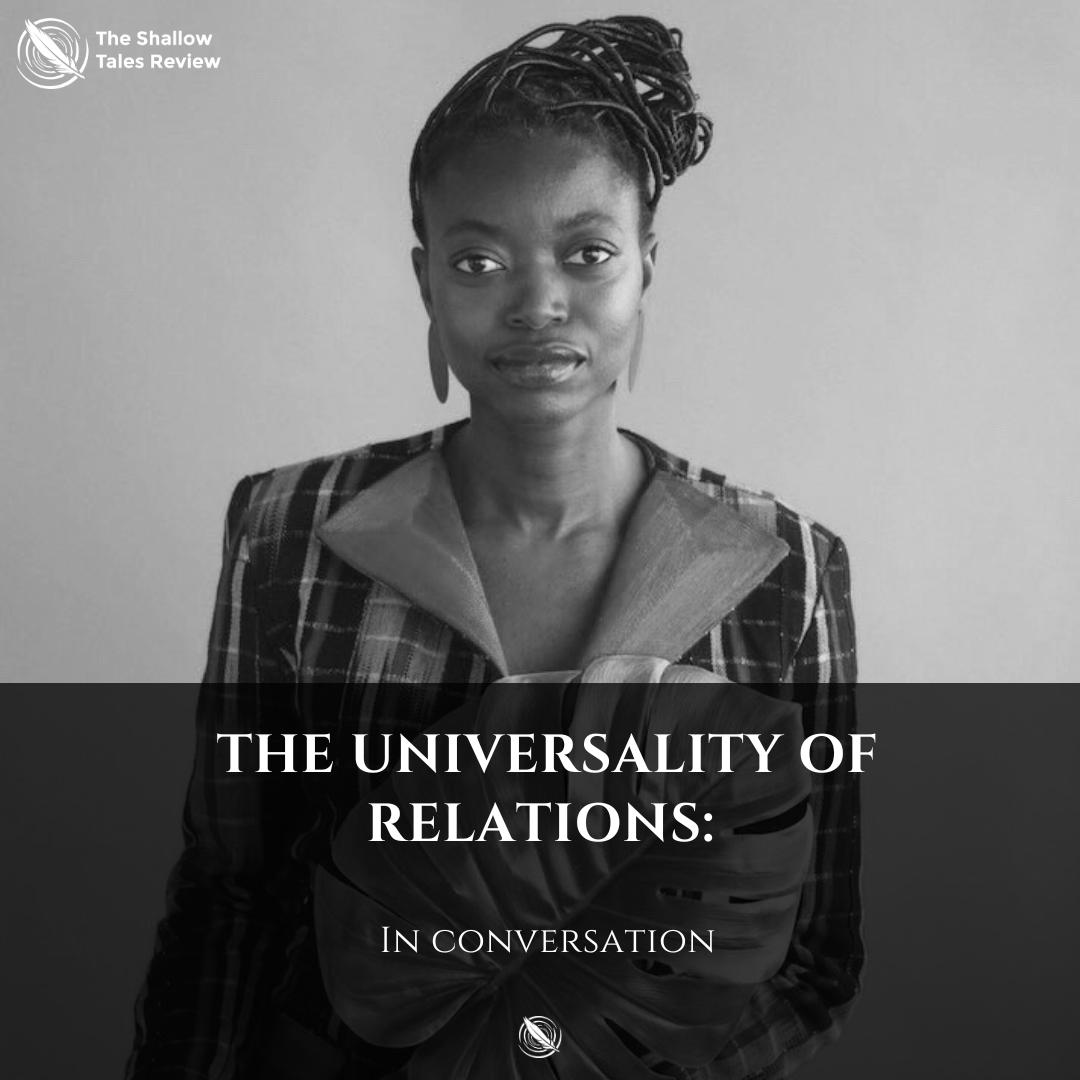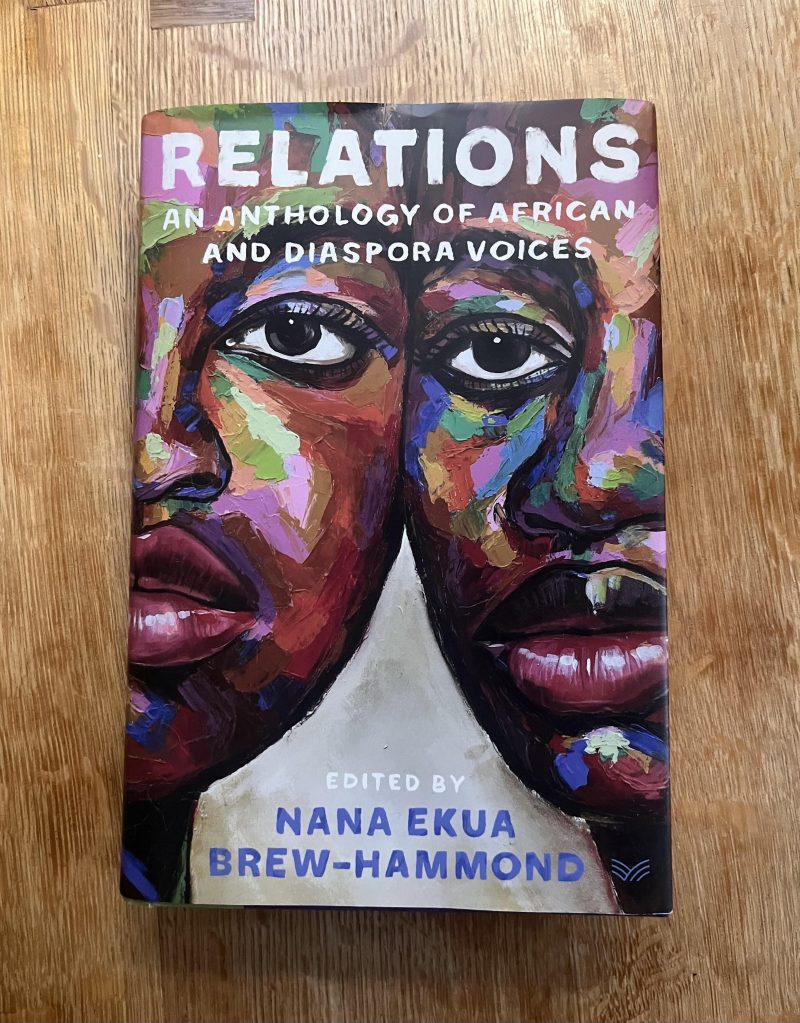Nana Ekua Brew-Hammond is the author of Powder Necklace: A Novel, Blue: A History of the Color as Deep as the Sea and as Wide as the Sky, Relations: An Anthology of African and Diaspora Voices, and My Parents’ Marriage: A Novel. Learn more at nanabrewhammond.com.
Let’s talk about your latest novel, My Parents’ Marriage. It joins in the same thematic thread of your previous writing. You make a compelling case for the usually unsaid complexities of family relationships. I particularly admire your influence on the characters’ reexamination of their own roots and image. What makes the motif of familial linkages so important for you?
Families fascinate me. They are a universe unto themselves with norms, codes, and histories that are both unique to them and illustrative of the wider milieu they are situated in. If you can see how a family operates behind closed doors, you will get a true window into the beliefs, attitudes, and systems of their society and, sometimes, the world. As a writer, families offer inexhaustive opportunity and incredible latitude to delve into the dramas of interpersonal dynamics, to play with language through external and inner dialogue, and to interrogate culture.
If any, what was your compelling force to write the novel?
There were so many reasons My Parents’ Marriage became urgent for me, but the most practical was I was on deadline. For more than a decade, I had been working on another novel set between 1962 and 2000 that followed the interwoven experiences of two women. This was a period of great upheaval in Ghana’s history with five military coups creating a volatile political, economic, and social reality that sent 1.5 to three million Ghanaians packing for better lives abroad. That novel had merit, but after many many revisions, I had to accept that it just wasn’t working. I had invested so much time and research into that book, it was excruciating to even think about pivoting. One of my editors asked me, “What made you want to write the book in the first place?” The truth was I did not know the answer anymore. I went back and read the manuscript and that’s when I saw it, or rather them. There were two troubled marriages driving the main characters’ actions, and perhaps because at that point I was in a serious relationship with marriage on my mind, it became clear to me that I wanted to focus the book on marriage. Once I made that decision, My Parents’ Marriage just flowed. By “flowed,” I don’t mean that it was easy. It was hard in a different way. I had to go deeper than research and ask myself how I felt about commitment and marriage, and where my feelings came from. Then, I had to write the novel from that place of vulnerability.
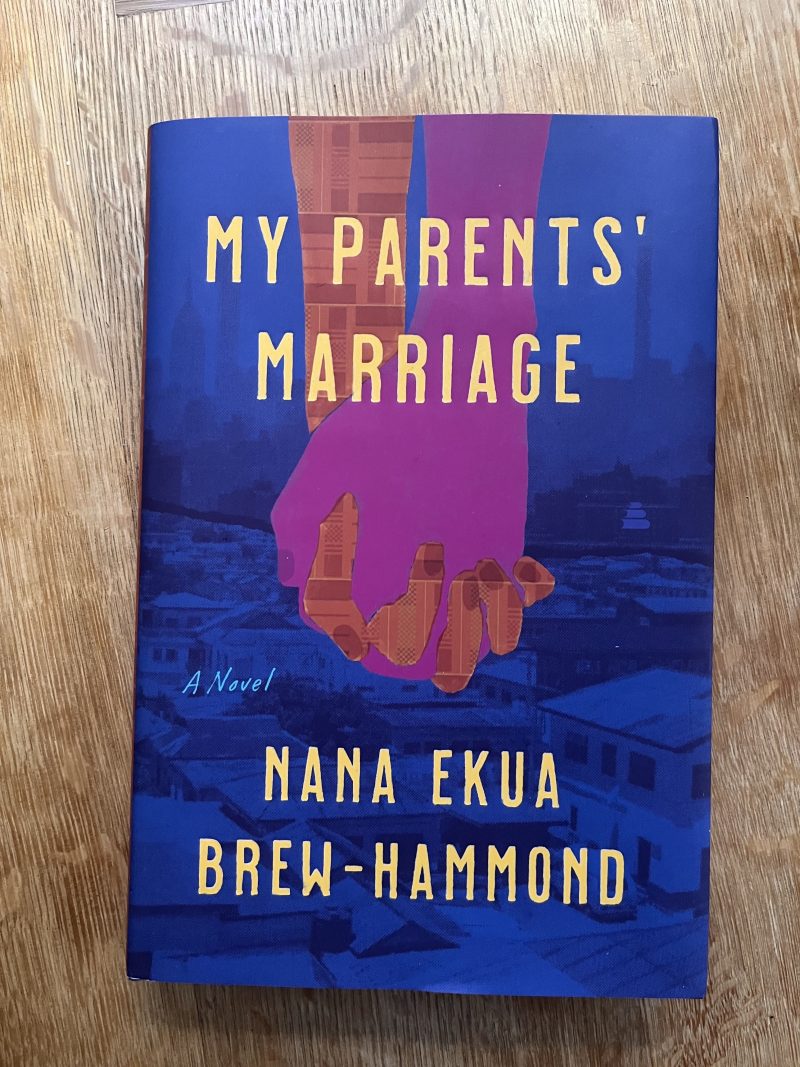
Much has been written about communal rot and historical trauma in Ghanaian postcolonial writing. The poetry of Kofi Awoonor is replete with some of these. Ayi Kwei Armah’s novel, The Beautyful Ones Are Not Yet Born, is perhaps one case too many. In a sense, African writing is now in its age of respite. To what extent would you say My Parents’ Marriage offers a standpoint on communal closure?
I think for readers and writers who are the children and grandchildren of that generation there is definitely a freedom to explore new traumas and delights. Equally, I believe there is a desire to better understand what aspects of that trauma we have inherited that aren’t obvious or haven’t been thoroughly examined. When I decided to turn the focus of my novel to marriage, I was surprised by how many of my women friends from Africa were mulling the marital and romantic experiences of their mothers and grandmothers, and how it affected their own choices in love and relationships. Authors like Mariama Bâ, Buchi Emecheta, and Ama Ata Aidoo are among the many writers in the postcolonial era who explored it, but a new generation like Ayesha Harruna Attah, Molara Wood, and Lola Shoneyin are also thinking through where we stand now, where we go from here, and what we lose in the balance. Closure comes to people differently so I don’t know that My Parents’ Marriage offers a standpoint on communal closure. If anything, I hope it encourages open dialogue between our generation and the ones that lived through colonialism. We’ve read the classics and the academic texts on colonialism, but how many of us have sat at our parents’ and grandparents’ feet and asked them how it felt to live through it not just politically but in the everyday?
You spent much of your childhood in the United States before leaving for home in Ghana when you were twelve. Coming from a culturally eclectic environment like the US, how prepared were you for resettlement in Ghana?
The U.S. was and is culturally eclectic, but it is highly segregated. In Queens, New York, which is statistically one of the most culturally diverse places in the country, where I grew up, different races and ethnic groups lived in separate neighbourhoods even if the neighbourhoods were close by. Moreover, there was a feeling that whiteness was the north star. The White neighborhoods were better than Black ones in terms of services and crime rate. White schools were better than Black ones because they were in White neighbourhoods. At one point, there was a Black shopping mall and a White shopping mall near us, and the Black one had metal detectors while the White one did not.
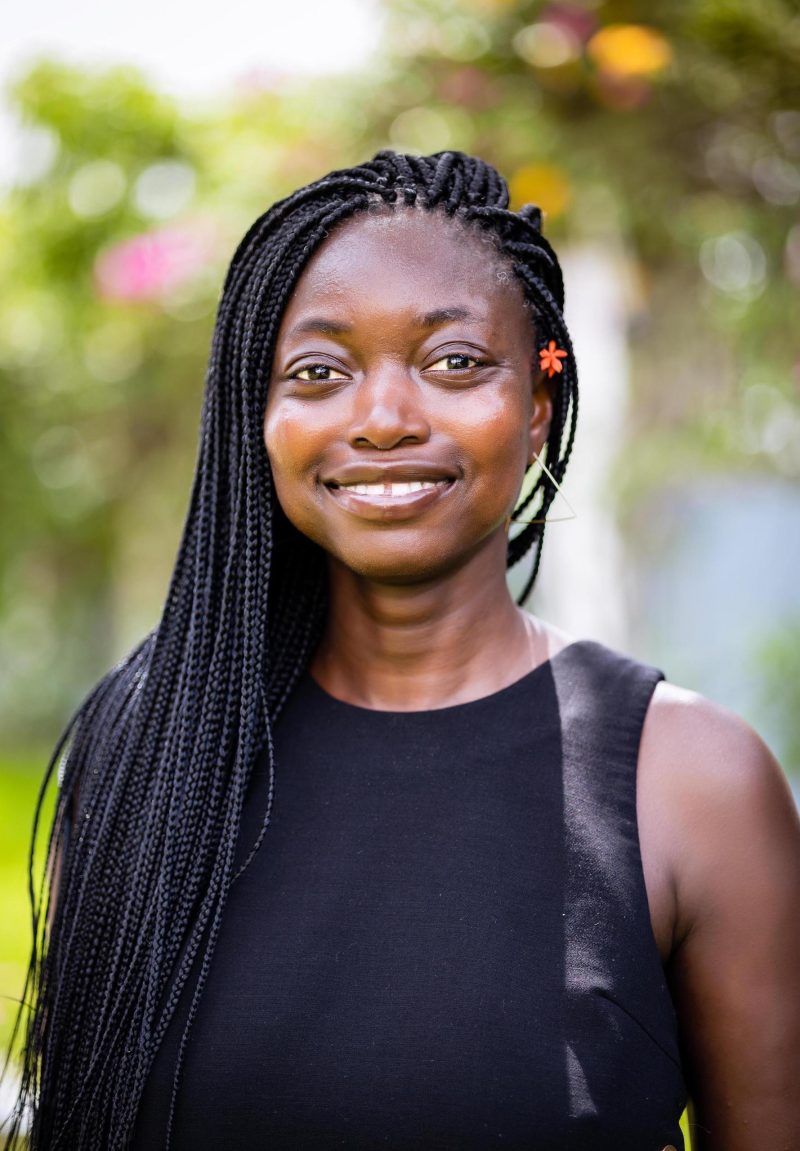
So when I went to Ghana at twelve years old, I had absorbed the prevailing cultural idea that being Black made me inferior to Whites and being African was worse because it was the birthplace of Blackness. I got the shock of my adolescent life when I learned rather Africa was a place I could take so much pride in! Wow. I look back now and can see I was drunk on pride in those first weeks in Ghana, so intoxicated to hear the middle name I zealously hid from my American friends spoken with such meaning, floating with the realisation that I had meaning, too. Suddenly, I could see and hear how incredibly cultured my family was. They spoke multiple languages in addition to English, sliding between three and four tongues depending on the venue they chose to be in. Their language wasn’t “funny sounding” or “embarrassing.” It was rather embarrassing that I had been so ashamed of it I had willfully eschewed every opportunity to speak it with my parents until I lost it. Suddenly, I wasn’t “pretty for a dark-skinned girl,” I was beautiful. Living in Ghana at that age fundamentally shifted my sense of who I was. I hated being in Ghana at the time, but now I am forever grateful for it.
You’ve mentioned that you grew up reading the works of American writers like Sidney Sheldon and Judith Krantz. You’ve also said that your exposure to African writing came when you moved to Ghana and encountered the work of Ama Ata Aidoo. Compared to the American and European texts you were exposed to all your childhood, what in those African books bolstered your conviction to read more books about Black people? What changed the game?
To be clear, I was exposed to African writing as a kid. My father told me Kweku Ananse stories and had Ayi Kwei Armah’s The Beautyful Ones are Not Yet Born on our bookshelf along with titles by Nkrumah and other African thinkers, but I was young and uninterested, desperate to affirm myself as an American. It was only when I went to school in Ghana and was forced to read Peter Abraham’s Mine Boy and Ama Ata Aidoo’s The Dilemma of a Ghost, among others on the syllabus, that I got to experience African stories in a context that felt affirming and even useful. The Dilemma of a Ghost is about a Ghanaian man who returns to Ghana with his African-American wife. It was enlivening to be able to relate to the characters who had names and issues I was familiar with. Being a kid, I didn’t realise how pivotal it was, but now I can trace my interest in Africana Studies courses in college when I returned to the States to those moments. My years in college and right after graduation coincided with a boom in African-American publications. Authors like Terry McMillan, E. Lynn Harris, Bebe Moore Campbell, and Jamaica Kincaid were breaking into the American zeitgeist and packing the Black sections in bookstore chains. I gravitated to those sections and collected as many books as I could afford, focusing first on the African-American books that were readily available before seeking out books by African authors. From Ama Ata Aidoo to Elaine Brown to Buchi Emecheta, I was waking up. The scales of blindness imposed by racist characterisations and projections of Blackness were slowly falling off, and in their place was a clearer understanding of the systems and agenda at work to ensure I believed those lies about myself and other Black people in the first place.
You edited Relations: An Anthology of African and Diaspora Voices. You noted last year in an interview that you are “…drawn to stories that tackle complicated family relationships.” I’m interested in finding out how this worldview influenced your curation of Relations, and what that experience taught you.
For Relations, I was driven by three things.
First, I wanted to bring a diversity of voices and experiences together in one book—to shatter any notion that there is one type of African person or story, or one way to be Black. To that end, I searched for writers from parts of the continent I had never read from, and I sought the help of translators so I could include authors who did not write in English. I also asked for recommendations.
Second, I wanted to explore the familial bonds common to many African cultures as well as the relatedness that arises out of sharing Black skin in a world that has sought to mark Blackness as inferior.
Third, I wanted to revel in the freedom that can happen when you are among relations—where you don’t have to over-explain your culture or context, and where you don’t need to be an authority on the problems plaguing Africa or Black people. In Relations, writers could feel free to defy my first two aims and just write about whatever beat their hearts.
Your first novel, Powder Necklace, was published in 2010. How had the success of that project reflected on your newer creative work? What lessons did you take along with you?
My experience with Powder Necklace taught me that being an author involves more than carefully crafting a narrative’s beginning, middle, and end. Although we often need to isolate to write, being an author means cultivating and contributing to a community. You need trusted readers who will read draft after draft of your work and offer you honest critical feedback. You need friends who will listen to you rant and vent when you’ve received yet another rejection. You need people who will show up to your book events and tell (or compel) their contacts to attend, too. You need to reach beyond your immediate circle and develop relationships with other authors, book club leaders and members, booksellers, and more—people you can grow with. You also need to find the balance between aggressively seeking your community’s support without reducing your relationship to what you want or need from them. You need to show up for people, read their work and offer your feedback, cheer on their successes, and share information that can help them when you have it.
Powder Necklace tells a fine story of cultural dislocation and reabsorption through the eyes of a teenage girl, Lila. To what extent do you think Lila’s experiences on her return to Ghana is shaped by her non-relationship with her father, as much as by her disconnect with her African culture?
That’s a great question. I think Lila was living a very cloistered life with her mother, by her mother’s well-meaning but trauma-informed design. It’s when Lila gets to Ghana that her world literally and figuratively opens up. Apart from her mother, she is free to consider another narrative of what happened between her parents, and what that means for her relationship with her parents and herself. She also has new permission to explore her identity both in connection to her parents and independent of them. Before she went to Ghana, Ghana was what her mother told her it was. After, Lila has her own experience to draw from.
Your protagonists are usually female children or young adults in a quest for self-identity and meaning. Thus, some critics describe you as a children’s writer or “coming-of-age” author. With the understanding of its benefits and limitations, how accepting are you of such tags, or any tags at all?
I am a children’s writer, too. My picture book Blue: A History of the Color as Deep as the Sea and as Wide as the Sky has earned awards and more recognition than my other titles so I get that some think of me in that way. As a writer who has also worked in advertising, I understand that labels function as a shorthand for easy classification and discovery. Moreover, every venue or publication has their own specific brand or lens their patrons come to them for so if you partner with them or they feature your work, they will present your work via the labels that resonate with their audience. That said, the nature of art is that it can’t truly be pinned down and never neatly fits the tags someone assigns to it. The same is true for the artist, so I try to hold all of that loosely and focus on creating work that resonates with my readers once they have found me through whatever label led them.
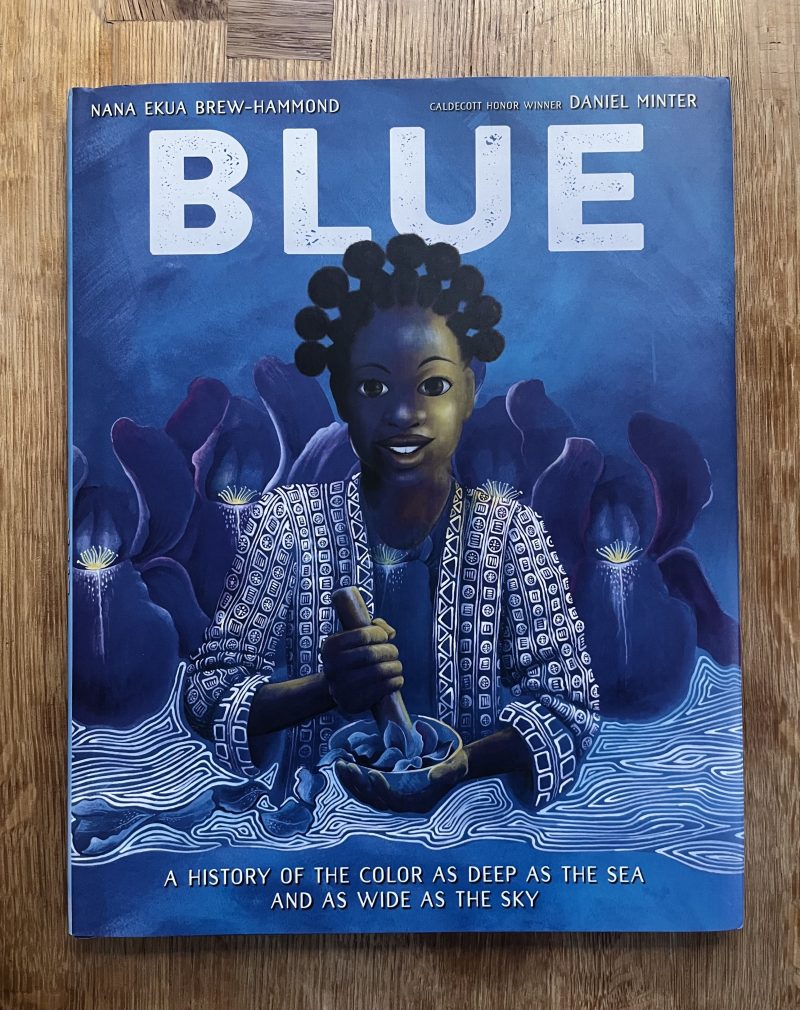
How would you define your approach to feminism?
I believe every human female is made in God’s image and inherently worthy of respect. We are not inferior to men. We deserve to be valued for all we are, and we deserve to be equitably afforded all we need to fully actualise our gifts and talents. Feminism doesn’t just raise women. When women are operating in their full powers, the entire society benefits.
In our brief conversation in Accra last month, I learned for the first time from you about your advisory role in HarperCollins. I doubt you talk very often about this in interviews. It is definitely laudable work you are doing on the background for African writers. Could you throw some more light on your work with the publishing house?
A few years ago, I was invited to recommend manuscripts that I believe would be of interest to them. It’s not my day job. I simply keep my ears open, and if I hear a writer speaking about a novel they’re working on that sounds interesting, I ask to read it. Because I know the hope that flares inside a writer when an opportunity like this is extended, I take it very seriously—I read every line, not just the first fifty pages or first three chapters, and offer them detailed and actionable feedback they can use to improve their manuscript. Some accept the challenge, knowing there are no guarantees the process will lead to publication, others choose not to. It’s a leap of faith for all involved. I invest a lot of time and energy, and again there is no guarantee the author will be published, but I love when I am able to forward along a manuscript to the publisher with a strong recommendation explaining why this work is important and not to be overlooked.
Much is being said today about contemporary Ghanaian literature. Recently, I spoke with a Ghanaian artist who complained that the country is deprioritising the promotion of art and literature. There have been other conversations around this, and they mostly face the angle of pessimism. How would you comment on this issue, especially as regards diasporic Ghanaian literature?
In 2004, under then-President Kufuor, the government of Ghana introduced an initiative to protect the domestic textile market. The “National Friday Wear” campaign, as it was called, encouraged Ghanaian professionals to wear traditional African prints and styles on the last day of the workweek. This was hugely beneficial to the businesses of local textile mills, seamstresses and tailors. If Ghanaian government or leaders across the country would get behind authors in a similar way, it would go far in strengthening the individuals and organisations already doing the work to shore up Ghanaian literature, and it would fortify the domestic and international market for Ghanaian literature.
What African writer today inspires your work?
I admire many contemporary African writers for different reasons.
I love how dexterous Ghanaian author Ayesha Harruna Attah is across genres, writing literary fiction, young adult literature, and romance—while working on a book I can’t wait to read and reference about the history of the kola nut!
Oyinkan Braithwaite’s My Sister, the Serial Killer is such a delicious novel—I am in awe of her ability to capture and express the nuances of relationships.
Yejide Kilanko is also one of my favourites. She observes her characters with such candor—they are all so real to me!
Lola Shoneyin is amazing! Asides the fact that she is a brilliant writer, her Aké Arts and Book Festival shines a spotlight on the depth and breadth of African literature. It is a bridge where writers from across the continent and diaspora come together to connect and learn from each other.
I also greatly respect Chimamanda Ngozi Adichie’s commitment to being forthright in her work and about her personal life. She’s such a trailblazer who has taken her work into spaces that were formerly outside the conventional purview of where literature and African literature are expected. It has been so exciting watching her career as she has gone from giving an instantly classic TED Talk to shining on the Met Gala red carpet.
What book(s) are you currently reading?
I just finished reading Slow Burn: The Work and Wonder of the Wait by Dawn Chere Wilkerson, a pastor who struggled with infertility for eight years. I was sure the book would cover her experience navigating the fertility industrial complex or just the pain and disappointment of her then-unrequited desire to give birth, but instead, it’s a book about all of the amazing things that happen while you wait for something you want.

